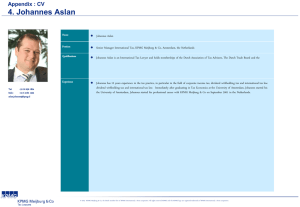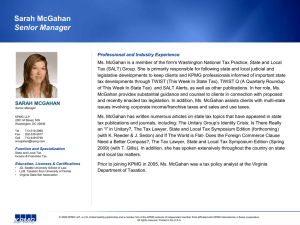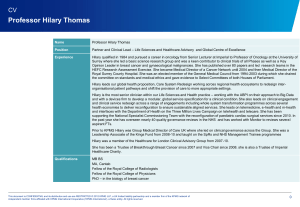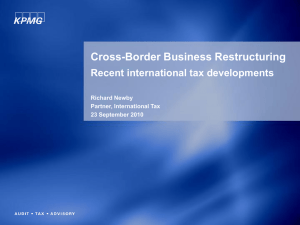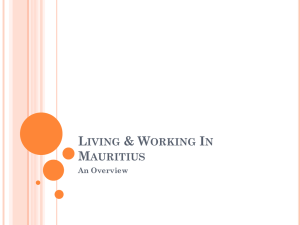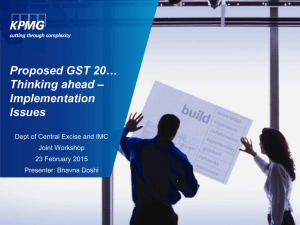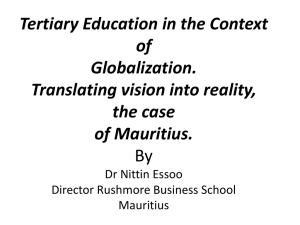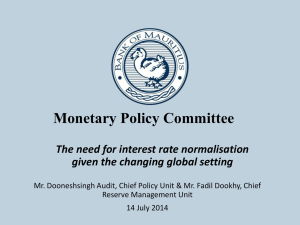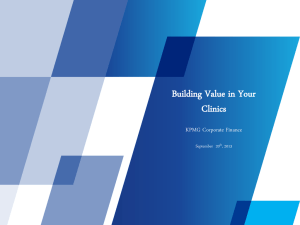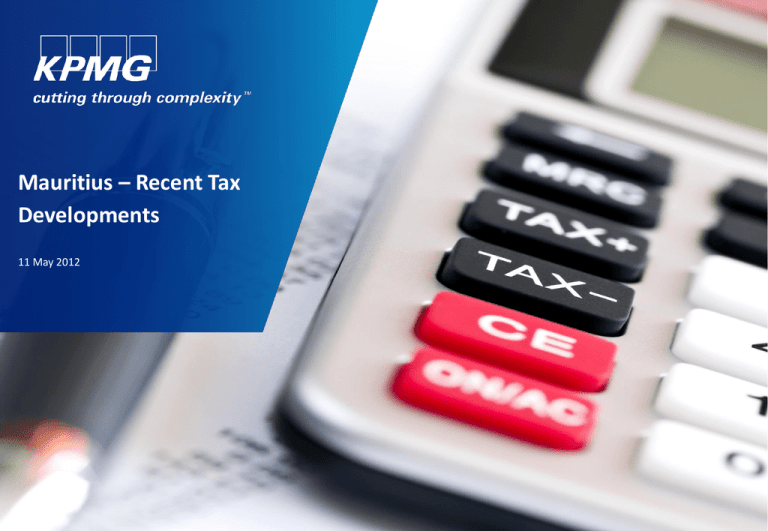
Mauritius – Recent Tax
Developments
11 May 2012
0
Agenda
1. Finance Act 2011
2. Tax Incentives Schemes
3. Limited Partnership Act
4. GAAR
1
Finance Act 2011
2
Finance Act 2011 – Main changes
■
Abolition of tax on capital gains on sale or transfer of immovable property
- w.e.f 5 November 2011
■
Indefinite exemption of income tax for freeport operators
■
Protected cell companies allowed to file separate tax return for each of its cells
■
CSR shall henceforth be computed based on chargeable income rather than book profit
■
APS returns not required to be filed where a company's taxable income does not exceed MUR
2 million
■
Banks may claim irrecoverable loan due by an SME as deductible expense
■
Solidarity income tax payable by individuals earning more than MUR 2 million has been
abolished - w.e.f 1 January 2012
■
CPS returns no longer required to be filed by individuals earning chargeable income of less
than MUR 2 million
© 2012 KPMG, a partnership registered in Mauritius is the Mauritius member firm of KPMG International, a Swiss cooperative. All rights reserved. KPMG logo are registered trademarks of KPMG International, a Swiss Cooperative.
3
Finance Act 2011 – Tax Deducted at Source (‘TDS’)
Amount or sum made available to the payee by way of -
Rate of tax
(%)
FA 2011
Rate of
tax (%)
Pre FA
2011
1.
Interest payable by a financial institution on deposits
Interest payable by any person (other than an individual) to a non-resident
10
10
-
2.
Royalties payable to –
(a) A resident
(b) A non resident
10
15
10
15
3.
Rent
5
5
4.
Payments to contractors and subcontractors
0.75
0.75
5.
Payments (other than by individuals) to Architect, Engineer, Land surveyor, Project manager, Property valuer,
Quantity Surveyor, Attorney/Solicitor, Barrister, Dentist & Doctor
3
3
6.
Payment made by Ministry, Government department, local authority, statutory body or the Rodrigues Regional
Assembly on contracts, other than payments to contractors and subcontractors and payments to providers of
services specified in the Fifth Schedule –
(a) for the procurement of goods and services under a single contract, where the payment exceeds
300,000 rupees;
(b) for the procurement of goods under a contract, where the payment exceeds 100,000 rupees; or
(c) for the procurement of services under a contract, where the payment exceeds 30,000 rupees
1
-
1
-
3
-
5
-
10
-
7.
Payment made to the owner of an immovable property or his agent pursuant to section 111B(g)
8.
Payment made to a non resident for any services rendered in Mauritius pursuant to section 111B(h)
© 2012 KPMG, a partnership registered in Mauritius is the Mauritius member firm of KPMG International, a Swiss cooperative. All rights reserved. KPMG logo are registered trademarks of KPMG International, a Swiss Cooperative.
4
Tax Incentive Schemes
5
Voluntary Disclosure of Income/ VAT Arrangement (VDIA)
Objective
• Provide an incentive to persons who have not declared or under-declared income or VAT in the
past to come forward with a voluntary disclosure to regularise their situation
Facilities granted
• Declarants will be granted full waiver of penalties and interest accruing up to 30 June 2012 on the
tax declared
• Income tax calculated at the rate of 15% irrespective of the year of undisclosed income
• Credit for input tax granted irrespective of taxable period in which VAT was under-declared
Procedure
• Declarants will have to file the following:
Return of undisclosed income
Statement of Additional VAT liability
Statement of assets and liabilities (Individuals)
Revised financial statements for companies (if applicable)
Objection and Appeal cases
• Person whose cases are under objection or appeal may avail themselves of the arrangement
VDIA terminates on 30 June 2012
© 2012 KPMG, a partnership registered in Mauritius is the Mauritius member firm of KPMG International, a Swiss cooperative. All rights reserved. KPMG logo are registered trademarks of KPMG International, a Swiss Cooperative.
6
Expeditious Dispute Resolution of Tax Scheme (EDRTS)
Objective
• Allow any person who was unable to dispute the tax claimed in an assessment issued prior to 1st
January 2011 under the Income Tax Act, VAT Act or Gaming Regulatory Authority Act to apply for a
review of the assessment
Procedure
• A taxpayer have to file an affidavit setting out the particulars of the assessment, the grounds for
review and a declaration to voluntarily waiving his rights to initiate any proceedings before any Court
with regard to the determination following the review
• A Panel of at least 3 officers of the MRA will review the assessment
• The Panel will have 3 months to make a determination from the date a valid application has been
referred to it
• On determination, the taxpayer will have to sign an agreement which will include the terms and
conditions for the settlement of the tax liability
EDRTS terminates on 30 June 2012
© 2012 KPMG, a partnership registered in Mauritius is the Mauritius member firm of KPMG International, a Swiss cooperative. All rights reserved. KPMG logo are registered trademarks of KPMG International, a Swiss Cooperative.
7
VAT Registration Incentive Scheme (VRIS)
Objective
•
Provide incentive to persons who have failed to register for VAT to regularize their situation
Operation
• Persons liable to register for VAT will be given a delay up to 31 March 2012 to file their application for
VAT registration and a delay up to 30 June 2012 to submit their statement of prior liability
Concessions granted
•
Persons who were liable to register prior to 1 January 2010 will be allowed to submit the statement
of prior liability only for the period commencing on 1 January 2010 and ending on the date of
registration
•
Persons who were liable to register on or after 1 January 2010 will have to submit the statement of
prior liability for the period they were required to register
•
All the newly registered persons will be entitled to take credit for input tax for the whole period for
which they submit their statement of prior liability
•
No penalty or interest will apply to the VAT payable if a newly registered person submits his
statement and effects payment by 30 June 2012 at latest
Delay given up to 31 March 2012 to register for VAT
© 2012 KPMG, a partnership registered in Mauritius is the Mauritius member firm of KPMG International, a Swiss cooperative. All rights reserved. KPMG logo are registered trademarks of KPMG International, a Swiss Cooperative.
8
Tax Arrears Settlement Scheme (TASS)
Objective
Waive up to 100% of penalty and interest payable on tax due by individuals and companies as an
incentive for taxpayers to settle their long outstanding tax liability. The Scheme covers Income
Tax, VAT and Gambling and Betting dues and taxes outstanding as at 31 December 2011 under a
return submitted or an assessment raised on or before 30 June 2006
Operation
TASS will apply to all taxes due including taxes due under objection and appeal
Concessions granted
A tax payer wishing to avail himself of the reduction of penalties/interest should make an application
to the Revenue Authority before 30 June 2012. Any application received after that date will not be
considered
The amount of penalty/interest to be waived will be written off from the Revenue Authority books only
after the total tax liability has been settled by 30 September 2012
TASS terminates on 30 June 2012
© 2012 KPMG, a partnership registered in Mauritius is the Mauritius member firm of KPMG International, a Swiss cooperative. All rights reserved. KPMG logo are registered trademarks of KPMG International, a Swiss Cooperative.
9
Limited Partnership Act
10
Limited Partnership Act
Key features of a Limited Partnership ('LP')
■
A LP may be formed in Mauritius to carry on any lawful business within Mauritius or
elsewhere
■
A LP must have a partnership agreement which shall be binding upon the partners,
setting out the affairs of the partnership and the conduct of its business
■
A LP can be set up with or without legal personality
■
A LP consists of one or more general partners and one or more limited partners
■
Unlimited liability of a general partner for the debts and obligations of the limited
partnership (subject to any indemnity in the partnership agreement)
■
The acts of the general partner in connection with the business of the LP binds the
partnership
■
A LP which is managed and controlled from Mauritius is eligible for a Category One
Global Business Licence (‘GBL 1’)
■
Migration of LPs from other jurisdiction to Mauritius is possible
© 2012 KPMG, a partnership registered in Mauritius is the Mauritius member firm of KPMG International, a Swiss cooperative. All rights reserved. KPMG logo are registered trademarks of KPMG International, a Swiss Cooperative.
11
Limited Partnership Act
Tax Treatment
■
Same income tax treatment as a resident société
■
A limited partnership is not liable to income tax but the general partner and limited
partner are liable to income tax on their share of income, whether distributed or not,
from the limited partnership
■
A limited partnership holding a GBL 1 licence may, by notice submitted to the MRA
and the FSC, opt to be liable to income tax at the rate of 15% and is entitled to
claim a credit for either the actual foreign tax suffered or 80% of the tax payable in
Mauritius, whichever is the higher
Distributions from such limited partnership are exempt from income tax
■
■
Where a limited partnership which holds a GBL 1 licence has not opted to be liable to
income tax, every partner of that partnership is liable to income tax on his share of
income at the rate of 15%
■
A non resident partner of a limited partnership is not liable to income tax on his share
of foreign source income derived by the limited partnership
© 2012 KPMG, a partnership registered in Mauritius is the Mauritius member firm of KPMG International, a Swiss cooperative. All rights reserved. KPMG logo are registered trademarks of KPMG International, a Swiss Cooperative.
12
GAAR
13
GAAR
90. Transactions designed to avoid liability to income tax
(1) This section shall apply where any transaction has been entered into or effected and that
transaction has, or would have had, but for this section, the effect of conferring a tax benefit on a
person, hereinafter referred to as relevant person, and having regard to—
(a)
the manner in which the transaction was entered into or carried out;
(b)
the form and substance of the transaction;
(c)
the result in relation to the operation of this Act that, but for this section, would have been
achieved by the transaction;
(d)
any change in the financial position of the relevant person that has resulted, will result, or
may reasonably be expected to result, from the transaction;
(e)
any change in the financial position of any person who has, or has had, any connection,
whether of a business, family or other nature, with the relevant person, being a change that
has resulted or may reasonably be expected to result from the transaction;
(f)
whether the transaction has created rights or obligations which would not normally be
created between persons dealing with each other at arm’s length under a transaction of the
kind in question; and
© 2012 KPMG, a partnership registered in Mauritius is the Mauritius member firm of KPMG International, a Swiss cooperative. All rights reserved. KPMG logo are registered trademarks of KPMG International, a Swiss Cooperative.
14
GAAR
(g)
(2)
the participation in the transaction of a corporation resident or carrying on business outside
Mauritius, the Director-General may conclude that the person, or one of the persons, who
entered into or carried out the transaction, did so for the sole or dominant purpose of enabling
the relevant person, either alone or in conjunction with other persons, to obtain a tax benefit.
Where subsection (1) applies, the Director-General shall assess the liability to tax of the
relevant person—
(a)
as if the transaction or any part thereof had not been entered into or carried out; or
(b)
in such other manner as the Director-General considers appropriate to counteract the tax
benefit which would otherwise be obtained.
(3) For the purposes of this section—
“tax benefit” means the avoidance or postponement of the liability to pay income tax or the
reduction in the amount thereof;
“transaction” includes a transaction, operation, or scheme whether or not such transaction,
operation, or scheme is enforceable, or intended to be enforceable, by legal proceedings.
© 2012 KPMG, a partnership registered in Mauritius is the Mauritius member firm of KPMG International, a Swiss cooperative. All rights reserved. KPMG logo are registered trademarks of KPMG International, a Swiss Cooperative.
15
GAAR
■
Income Tax Act 1974
■
Applied only in three renowned tax cases:
–
Sir Gaetan Duval Q.C v/s Commissioner of Income Tax (1983)
–
Royal Gardens v/s Commissioner of Income Tax (1999)
–
BH Industries (Mauritius) Ltd v/s Assessment Review Committee & MRA (2012)
© 2012 KPMG, a partnership registered in Mauritius is the Mauritius member firm of KPMG International, a Swiss cooperative. All rights reserved. KPMG logo are registered trademarks of KPMG International, a Swiss Cooperative.
16
GAAR
BH Industries (Mauritius) Ltd v. ARC & Director General, Mauritius Revenue Authorities
Facts
■
BH Industries (Mauritius) Ltd ('BHIL') was a manufacturer of garments and was engaged in export of the garments
to France
■
BHIL was an incentive company availing benefits of tax holidays
■
Close to the end of tax holiday, BHIL had set up another company ('BHEL.') as a freeport company and routed all
the goods for export through the same
■
BHEL was exempted from tax as it operated in the Freeport
■
BHIL and BHEL have the same shareholders and directors , thus were related parties
Issue
■
Whether the transactions between BHIL and BHEL were entered into for the sole or dominant purpose of
obtaining a tax benefit and, if that were so, the transactions should be disregarded in accordance with S90 of the
Income Tax Act 1995
© 2012 KPMG, a partnership registered in Mauritius is the Mauritius member firm of KPMG International, a Swiss cooperative. All rights reserved. KPMG logo are registered trademarks of KPMG International, a Swiss Cooperative.
17
GAAR
BH Industries (Mauritius) Ltd v. ARC & Director General, Mauritius Revenue Authorities
Held
■
The mark up of BHIL in the taxable period dropped significantly compared to the exempt period
■
BHEL was making substantial profits whereas BHIL was even declaring losses
■
BHEL had no full time employee and was paying BHIL a management fee for expenses incurred by BHIL and for
services
■
All the importation and storing of raw materials, production costs up to the finished goods, factory overheads,
packaging, marketing and transportation from factory to harbour were solely done by BHIL
■
The issued capital of BHEL has not been paid by the shareholders
■
All the goods produced by BHIL were sold to BHEL which in turn exported via Freeport
■
Therefore, the selling of the products by BHIL to BHEL was ‘merely an artificial device’ designed solely or
predominantly for BHIL to obtain a tax benefit
© 2012 KPMG, a partnership registered in Mauritius is the Mauritius member firm of KPMG International, a Swiss cooperative. All rights reserved. KPMG logo are registered trademarks of KPMG International, a Swiss Cooperative.
18
Thank you
Wasoudeo Balloo
Tax Partner
KPMG
Tel:
+230 406 9891
Fax:
+230 406 9988
Email: wballoo@kpmg.mu
© 2012 KPMG, a partnership registered in Mauritius is the Mauritius member
firm of KPMG International, a Swiss cooperative. All rights reserved. KPMG
logo are registered trademarks of KPMG International, a Swiss Cooperative.
The KPMG name, logo and ‘cutting through complexity’ are registered
trademarks or trademarks of KPMG International Cooperative (KPMG
International).
www.kpmg.com

